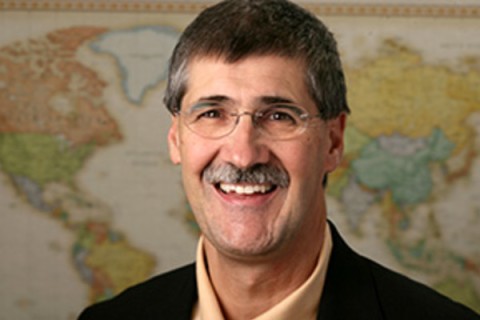John Paul Lederach to receive Niwano Peace Prize
Lederach is being honored for his four-decade-long peacebuilding career.

John Paul Lederach, a practitioner-scholar of justice and peacebuilding, will receive the 2019 Niwano Peace Prize.
The award, presented May 8 in Tokyo, includes 20 million yen, roughly $179,000. The Niwano Peace Foundation gives the award “to honor and encourage those who are devoting themselves to interreligious cooperation in the cause of peace,” the foundation writes on its website.
“While Dr. Lederach has consulted with the highest-level government officials and national opposition movements in war-torn settings like Nicaragua, Somalia, Northern Ireland, Colombia, Nepal, and the Philippines, in many of those same locations he has provided accompaniment for local communities most affected by the decades of violence,” the prize committee wrote. “Lederach’s academic work draws on this rich experience in the field as a mediator, negotiator, peacebuilding practitioner, trainer, and consultant.”
Read our latest issue or browse back issues.
Lederach is professor emeritus of international peacebuilding at the Kroc Institute for International Peace Studies at the University of Notre Dame and a distinguished scholar at Eastern Mennonite University, where he was founding director of the Center for Justice and Peacebuilding. He has trained many in conflict transformation and authored two dozen books, including The Moral Imagination: The Art and Soul of Building Peace (2005).
“Peacebuilding is not about a single person but rather how whole collectives cohere, how communities rise and respond to challenges, and how families stay strong,” Lederach wrote in his acceptance letter, as quoted by Eastern Mennonite. “For me, the deepest aspirations of my faith tradition provided inspiration to move beyond barriers and boundaries. The infinite, boundless, and audacious love of the Divine toward humanity stirs us to notice and learn from this gifted diversity, to build lasting and improbable friendships across our brokenness, and to fearlessly seek to understand those with whom we disagree.”
In his 40 years in conflict transformation, Lederach has been involved in peace processes that have lasted decades, he noted in an interview with the Christian Century in 2009.
“In the professional mediation circuit, most people think of bringing people together over several weeks to solve a dispute,” he said. “When I speak about the need for long-term engagement, I often feel like I am speaking a foreign language in my own professional community.”
He sees a need for both grassroots efforts and high-level political negotiation.
“You need to find a way for political structures to function well, and you need to change the way that people do politics,” he told the Century. “But the political process is very easily manipulated and very easily discarded. So you need a foundation that will hold the political process accountable. People’s everyday problems are not likely to be solved with a dictate from the highest level. If people are going to start relating to each other, responsibility has to be taken at the local level.”
Janna Hunter-Bowman, professor of peace studies and Christian social ethics at Anabaptist Mennonite Biblical Seminary, wrote on social media that Lederach has demonstrated in his life the principles he espouses.
“Hundreds, probably thousands, of practitioners and practitioner-scholars have been shaped by his vision, practice, and mentoring,” she wrote.
The prize is named for Nikkyō Niwano, founder of the lay Buddhist organization Risshō Kōsei Kai.
Past recipients of the Niwano Peace Prize include Palestinian Lutheran bishop Munib A. Younan, Nigerian pastor Esther Abimiku Ibanga, the Corrymeela Community, and Rabbis for Human Rights.






